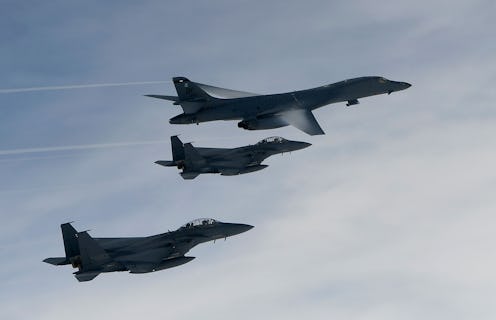News
Why Putting U.S. Nuclear Bombers On A 24-Hour Alert Would Be A Dangerous & "Unnecessary" Risk

As reported recently by Defense One, a military and national security analysis website, the United States military is preparing to put nuclear-armed bombers back on 24-hour ready alert. It would mark the first time that this alert has been activated since the waning days of the Cold War in 1991.
A 24-hour would alert ready planes equipped with nuclear weapons for stationing and take off at any time from various U.S. bases. While defense officials stressed to Defense One that a 24-hour alert has not been activated (indeed, Fox News reported that officials it contacted denied bombers were ordered to go on 24-hour alert), they emphasized that the military was indeed preparing for a potential activation of this alert, citing increasing tensions with North Korea as a potential driving force behind this change.
Gen. David Goldfein, the Air Force's chief of staff and a member of the Joint Chiefs of Staff, spoke at length about the issue with Defense One during his six-day tour of U.S. Air Force bases that support the country's nuclear mission. Goldfein stressed the importance of preparation to the outlet and emphasized the unpredictability of world affairs today in explaining the impetus behind the possible revival of the alert.
This is yet one more step in ensuring that we're prepared. ... I look at it more as not planning for any specific event, but more for the reality of the global situation we find ourselves in and how we ensure we're prepared going forward.
The world is a dangerous place and we've got folks that are talking openly about use of nuclear weapons. ... It's no longer a bipolar world where it's just us and the Soviet Union. We've got other players out there who have nuclear capability. It's never been more important to make sure that we get this mission right.
According to Defense One, the official decision to reactivate the 24-hour ready alert would be made by either head of U.S. Northern Command (NORTHCOM) Gen. Lori Robinson, or commander of U.S. Strategic Command (STRATCOM) Gen. John Hyten.
Discussion of reactivating the 24-hour nuclear bomber alert for the first time in 26 years comes amidst increasingly hostile rhetoric between the United States and North Korea. In a recent U.N. speech, President Trump warned North Korea, saying, "The United States has great strength and patience, but if it is forced to defend itself or its allies, we will have no choice but to totally destroy North Korea." Trump also referred to Kim Jong Un as "Rocket Man" and said that he was on a "suicide mission."
More recently, Trump expressed during an interview with Fox News that the U.S. was well-equipped to address any potential threats from North Korea: "We're so prepared like you wouldn't believe ... You would be shocked to see how totally prepared we are if we need to be."
North Korea has also stepped up its war-of-words. Following Trump's U.N. speech, Kim released a statement calling him a "mentally deranged U.S. dotard" and threatened that the U.S. will "pay dearly for his speech."
John Tirman, the executive director for MIT's Center for International Studies tells Bustle that Trump choosing to re-activate the 24-hour alert would be an "unnecessary" decision that could increase the likelihood of miscommunication between countries.
"The triad (land-based missiles, submarine-based missiles, and bombers) is stable and 'ready' as is. In fact, bombers are the least important leg of the triad," Tirman says. "But by putting them on alert, the possibility of a miscalculation or accident grows ... putting bombers on this alert would be going in the wrong direction. It adds another signal that our adversaries, too, should escalate."
Moreover, North Korea has repeatedly antagonized nearby Japan, a staunch U.S. ally, by firing missiles over the country, prompting panic and the activation of alert sirens.
Even though the 24-hour ready alert has not been activated for U.S. nuclear bombers, there certainly seems to be a strong possibility that an activation is coming, given the exceedingly hostile rhetoric between the U.S. and North Korea. Many will likely be closely watching to see whether or not the Trump administration comments on the possibility of re-activating this escalated alert status for the first time since the Cold War.